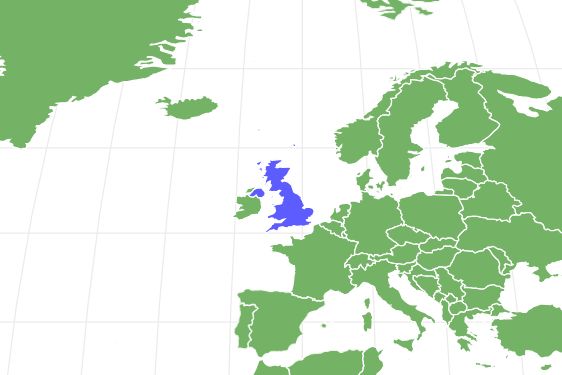Welsh Terrier
Canis lupus
The Welsh Terrier has the strength and tenacity to take on foxes and badgers.
Advertisement
Welsh Terrier Scientific Classification
- Kingdom
- Animalia
- Phylum
- Chordata
- Class
- Mammalia
- Order
- Carnivora
- Family
- Canidae
- Genus
- Canis
- Scientific Name
- Canis lupus
Read our Complete Guide to Classification of Animals.
Welsh Terrier Conservation Status
Welsh Terrier Facts
- Fun Fact
- The Welsh Terrier has the strength and tenacity to take on foxes and badgers.
- Temperament
- Friendly, curious, and hard-working
- Diet
- Omnivore
Welsh Terrier as a Pet:
- General Health
- Energy Level
- Shedability
- Trainability
- Intelligence
- Tendency to Chew
- Size
- Family and kid friendliness
- Yappiness / Barking
- High
- Hypoallergenic
- Yes
- Separation Anxiety
- Moderate
- Preferred Temperature
- Average climate
- Exercise Needs
- Moderate
- Friendly With Other Dogs
- High
- Pure bred cost to own
- $800 to $1,200 on average
- Dog group
- Terrier
- Male weight
- 17-22 lbs
- Female weight
- 15-20 lbs
This post may contain affiliate links to our partners like Chewy, Amazon, and others. Purchasing through these helps us further the A-Z Animals mission to educate about the world's species.
View all of the Welsh Terrier images!
The Welsh Terrier was bred in northern Wales for hunting foxes, badgers, otters, and rodents.
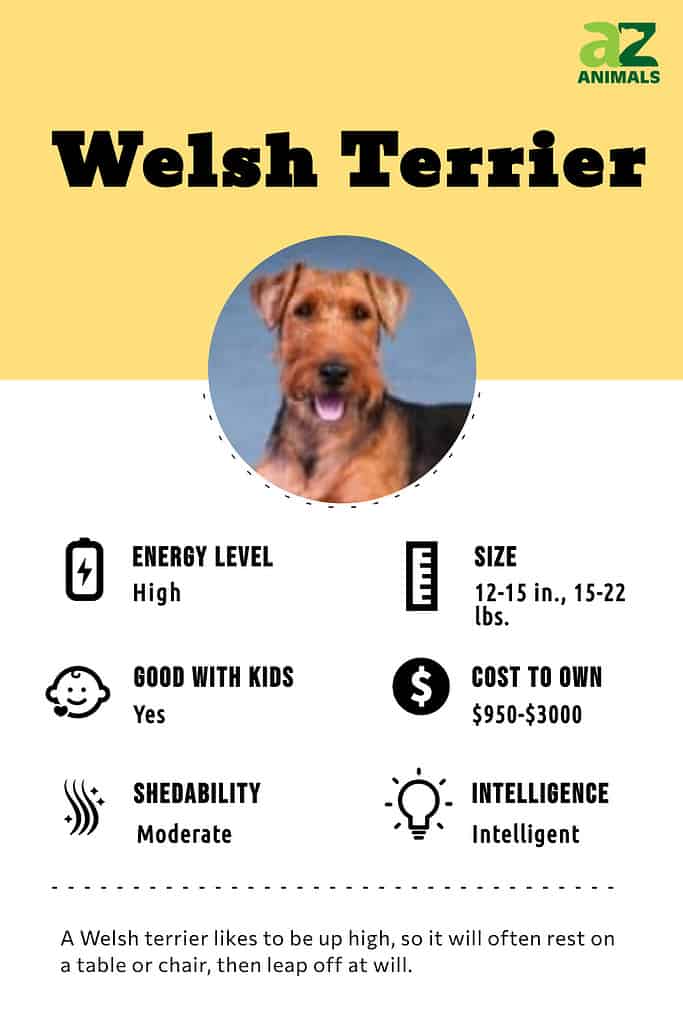
The Welsh Terrier is a breed of long-legged earth dogs with an iron constitution and exceptionally strong spirit. It was developed in the 18th century (and perhaps even earlier) for hunting foxes, badgers, and otters in the rugged terrain of northern Wales. The dog has a brave, athletic, and intelligent nature that reflects this occupation. In order to find prey hidden in burrows and dens, its body is specifically designed to dig with the front paws by throwing up dirt through the rear legs.
See all of our expert product reviews.
Most British terriers are thought to have descended directly from the now-extinct Old English Black and Tan Terrier. The dog’s appearance has not changed much since those days. Black and tan is the only color combination available (although the tan color varies between dark red and light brown). Other characteristics of this breed include a square body, vertically inclined tail, and bushy moustache and beard. This breed was first recognized by the American Kennel Club in 1888.
Welsh Terrier vs. Airedale
Despite some subtle differences in their personality (which most owners won’t even notice), the Welsh Terrier is often said to be a miniature version of the large Airedale. The physique, coat, and temperament are all fairly similar.
3 Pros and Cons of Ownership
| Pros | Cons |
|---|---|
| Lively and Spirited The Welsh Terrier is an exuberant, fun-loving companion for the entire family. | Strong Prey Drive Unless properly trained, this dog has the tendency to chase after small animals, even ignoring its owner’s commands. |
| Athletic This breed is a good choice for owners who want a playmate and exercise companion. | Tendency to Dig This breed has a natural instinct to dig holes. |
| Hard-Working This breed loves to be given a task to do. | Grows Bored Easily The Welsh Terrier needs plenty of activities to do throughout the day. |
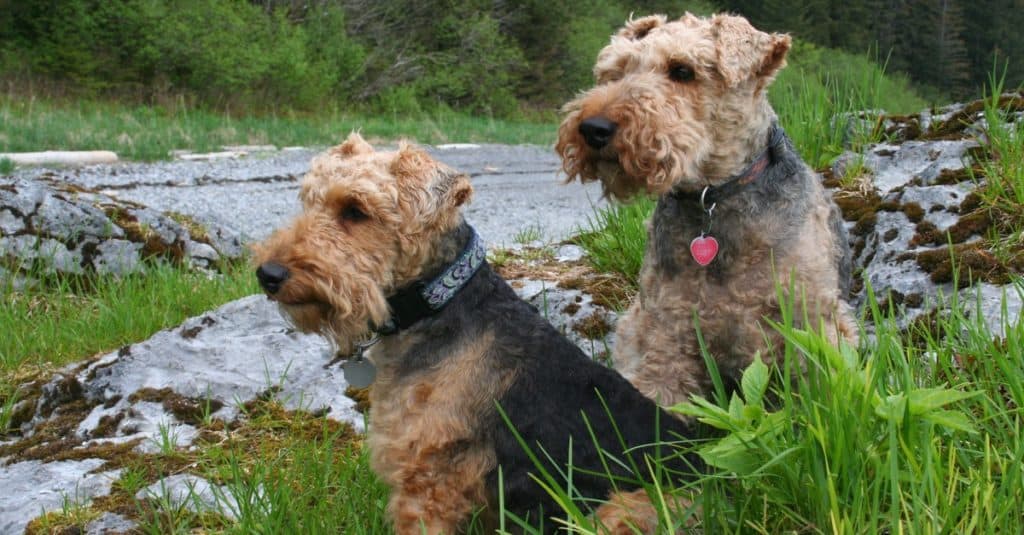
The Welsh Terrier is a fun-loving dog but a hard worker too.
©Joy Prescott/Shutterstock.com
Size and Weight
The Welsh Terrier is a miniature long-legged working breed with a muscular frame. Males are slightly larger than females on average.
Health and Entertainment for your Welsh Terrier
- The Best Wet Food for Senior Dogs
- The Best Dog Food for Labrador Retrievers (Senior, Puppy, and Adult)
- These Are the Best Probiotics for Dogs (They Actually Work)
- Victor Senior Healthy Weight Dog Food Review: Recalls, Pros, Cons, and More
- The Best Dog Food for Small Dogs (Puppy, Adult, Senior): Ranked and Reviewed
See all of our expert product reviews.
| Height (Male) | 13 to 15 inches |
| Height (Female) | 12 to 15 inches |
| Weight (Male) | 17 to 22 pounds |
| Weight (Female) | 15 to 20 pounds |
Common Health Issues
The Welsh Terrier is a fairly healthy breed with a life expectancy of some 12 to 15 years (although in the right circumstances, it may live up to 18 years). This breed has the tendency to suffer from allergies, cataracts, glaucoma, epilepsy, hypothyroidism, cancer, lens luxation (a weak ligament that holds the lens in place), hip dysplasia (a genetic condition that results in a partially or fully dislocated hip joint), and Legg-Calve-Perthes disease (a degenerating hip that results from poor blood supply). A good breeder should be able to minimize or eliminate some genetic conditions, but any breed of dog will have some predisposition to health problems. In summation, here’s a list of the most common issues:
- Allergies
- Cataracts
- Glaucoma
- Cancer
Temperament
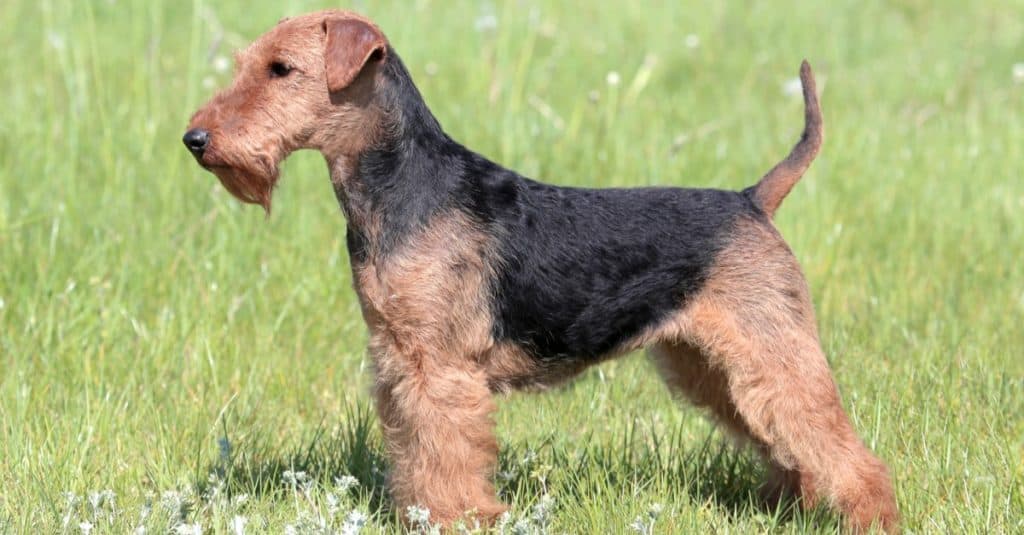
The Welsh terrier needs lots of mental and physical stimulation.
©Radomir Rezny/Shutterstock.com
The Welsh Terrier has a friendly, confident, outgoing, and adventurous personality that many owners may find endearing. This dog is a little calmer than the typical high-wire and frenetic terrier, but you will still need to spend a lot of time with this dog and provide it with plenty of mental and physical stimulation. Otherwise, if it becomes bored and lonely, and then it might resort to destructive and unwanted behavior. This breed can adapt well to apartment living as long as you have enough outdoor space in which it can play. A fenced yard is highly recommended, however.
Care
Despite its miniature size, the Welsh Terrier is a fairly high maintenance type of dog. Some prior experience with terriers is recommended, though not strictly necessary as long as you’re fully prepared to deal with the dog’s considerable grooming, exercise, and training needs. If you are still in the planning stages of getting a dog, then the first step is to find a high-quality breeder in your area with a strong reputation for raising healthy and happy dogs. As tempting as it may be to settle for a lower price dog, this is more likely to cause problems down the road. If price is an important factor, then consider adoption. You may be able to find a shelter or rescue group in your area, although not many rescue groups may be aimed at the Welsh Terrier specifically.
Best Dog Food
An adult Welsh Terrier should need around one cup of high-quality dog food every day. The exact amount will depend on the dog’s age, size, and activity level. Due to its tendency to gain weight, it is not a good idea to leave out food or hand out too many treats. If the dog has a healthy weight, then you should be able to feel but not see the ribs.
Please note that this breed often deals with allergies and food sensitivities. Consider looking at limited ingredient or allergy-control dog food for your pet.
A-Z Animals selects Wellness CORE Digestive Health Small Breed Dry Dog Food with Wholesome Grains as the best dog food for Welsh Terriers.
What we like about this recipe is how the probiotic-coated kibble with prebiotic fiber sustains a robust immune system that starts with a balanced gut microbiome. With no wheat, corn, soy, or unnecessary artificial additives, the taurine is another benefit for your dog’s eyes.
Check Chewy and Amazon for this product
- Chicken and brown rice recipe for small breeds
- Contains fiber-rich superfoods for healthy digestion
- Antioxidants and prebiotics for healthy immune system
Maintenance and Grooming
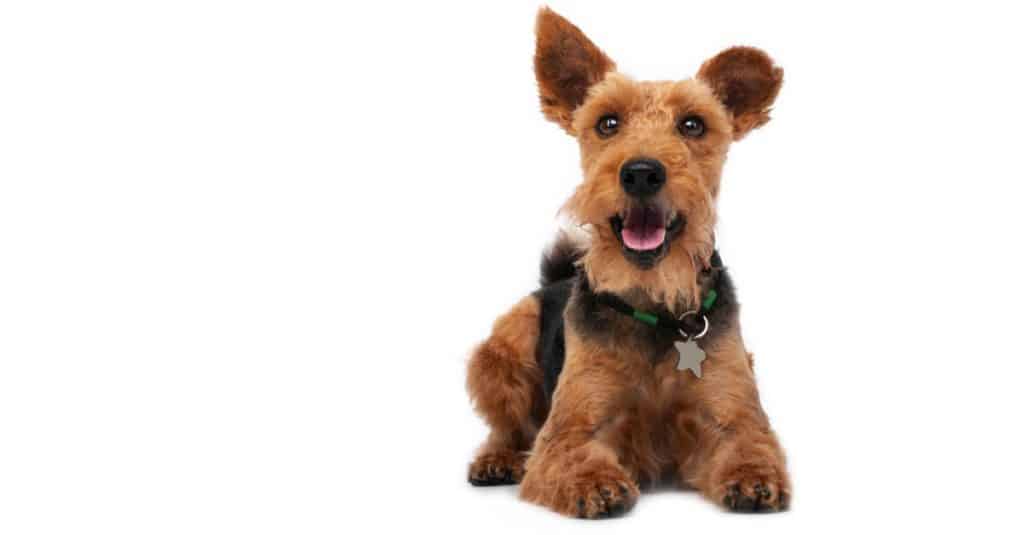
The Welsh terrier’s fur can become matted and tangled, so frequent grooming is necessary.
©Sergii Adamchuk/Shutterstock.com
The Welsh Terrier needs to be brushed two to three times a week to prevent matting and tangling. The coat should be clipped less often, around 8 to 12 weeks, and can grow longer in the winter than the summer. It is recommended that you employ a method called hand stripping, which involves removing the dead hair by hand from the roots. This technique is generally better for the health and consistency of the coat, but it may take months or years to fully master. If you don’t have the time or inclination to groom the dog yourself, then you can also take it to a professional groomer. Fortunately, the coat should otherwise keep itself fairly clean. Bathing should only be done on occasion with high-quality shampoo and moisturizer when the dog becomes particularly dirty. It is also recommended to trim the nails and brush the teeth at least once a week.
Training
The Welsh Terrier is an intelligent but independent-minded breed that will grow bored very quickly with repetition. In order to keep its attention focused, you might want to provide a varied and unpredictable training routine that keeps things short but interesting. This should be supplemented with positive reinforcement like treats and praise; do not raise your voice or become aggressive. But also don’t let this dog take control of the training process. You should always let it know you’re the leader. If you’re struggling a bit, then it might be worth paying the price for a professional trainer.
Exercise
The Welsh Terrier will need at least 30 to 60 minutes of exercise per day to burn its immense reservoirs of energy. Walks or runs should always be a part of its daily routine. This should be supplemented with toys, balls, sports, and other playtime activities. However, whenever you venture outdoors, it is not a good idea to let this dog off the leash. Its prey instincts might take over and override its training. This dog will benefit from a fenced yard that it cannot jump over or dig under. For sporting or competitive owners, the Welsh Terrier should do very well in games and competitions, like earth dog trials, designed to replicate the natural way it hunts in the wild.
Puppies
There are several things you might want to keep in mind before bringing your Welsh Terrier home from a breeder, shelter, or rescue group. First, don’t be surprised to find that the puppies are born with a black coat. They will only develop the full adult coat later. Second, its body is a bit sensitive to physical contact, so you should be careful about letting it jump, climb, and exercise on hard surfaces. Third, puppies need to be properly trained and socialized as early as possible in order to become a well-behaved adult.
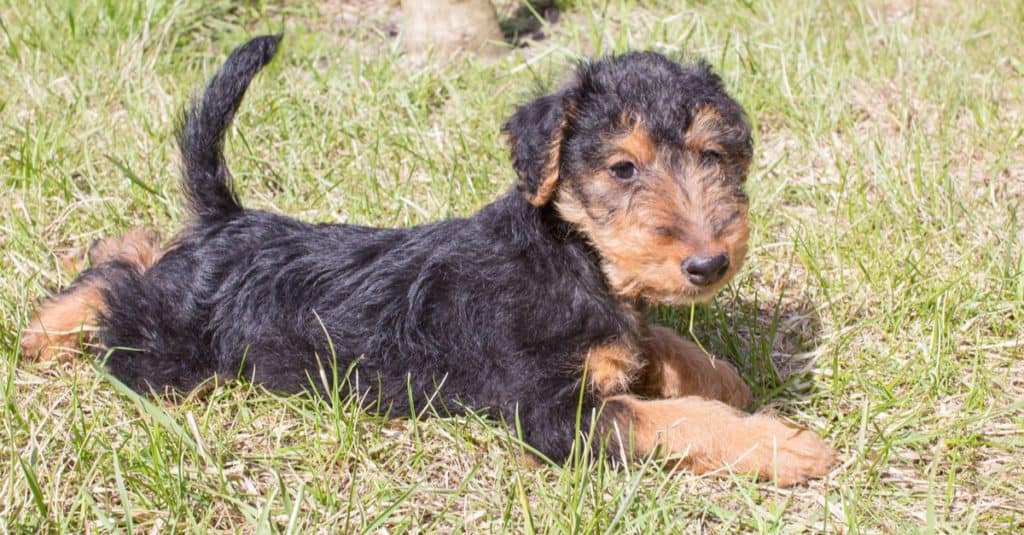
©Szymon Mucha/Shutterstock.com
Crate training, though not necessary, might be a good way to give your dog a safe and protective space. Once your dog is comfortable with the crate, you can use it to transport the dog around. Finally, your dog will need regular and predictable checkups at the vet starting from the moment you bring it home.
Children
The Welsh Terrier has a kind, friendly, and outgoing disposition that should appeal to people of all ages, but its constant high-energy motor might overwhelm or upset some younger kids. You should always monitor any interactions between dogs and young children and be prepared to intervene in case it goes poorly.
Similar Dogs
The Welsh Terrier is quite similar in behavior and appearance to the following British terriers:
- Airedale – As mentioned previously, the Airedale resembles a Welsh Terrier in almost all other respects except for its size. This breed’s comparatively large body has earned it the nickname of the King of Terriers.
- Lakeland Terrier – Originating from the Lake District of northern England, the Lakeland Terrier was primarily bred for one purpose: to rid farms of foxes and protect sheep. It has a very similar appearance to the Welsh Terrier but comes in a wider variety of colors and markings.
- Irish Terrier – Originally bred as an all-around farm dog and vermin hunter, this is a long-legged terrier with a fierce red coat of rough fur. Owners should enjoy its energetic yet genial personality.
Famous
- Charlie – This was the personal dog of John F. Kennedy, given to him by Jacqueline during the 1960 presidential campaign. The bond between them was so strong that Charlie accompanied him on late-night walks and swims.
- Gwen – Edward VIII, who was briefly the British monarch in 1936 until he abdicated from the throne, owned a Welsh Terrier by the name of Gwen.
- Ting – This was the personal dog of Clement Attlee, who was the British Prime Minister between 1945 and 1951, succeeding Winston Churchill. As a member of the nobility, he even had this dog incorporated into his coat of arms.
Popular Names
If you need some help with a good dog name, then you might want to consider the following suggestions:
- Sasha
- Penny
- Sandy
- Rosie
- Teddy
- Bear
- Bentley
- Molly
- Daisy
- Lucy
Welsh Terrier FAQs (Frequently Asked Questions)
What is a Welsh Terrier?
The Welsh Terrier is a friendly and intelligent working dog originating from Wales with a rough, lightly shedding, hypoallergenic coat and athletic frame.
Is a Welsh Terrier a good family dog?
The Welsh Terrier makes for an excellent family dog as long as your household puts in the time and effort to care for its physical and mental needs.
Do Welsh Terriers like to cuddle?
The Welsh Terrier does enjoy the affection of its owner, but this breed should not be mistaken for a lap dog.
Can Welsh terriers be left alone?
The Welsh Terrier should not be left alone for very long if you can help it. This dog might be okay for short stretches of time, but eventually, it will become bored and lonely and might engage in some unwanted behavior. That is why it might be a good idea to have a family member or friend around to care for it while you’re away.
Do Welsh Terriers shed hair?
The Welsh Terrier is a light shedding dog with a very good hypoallergenic coat.
What are the key differences between a Lakeland Terrier and a Welsh Terrier?
The key differences between a Lakeland Terrier and a Welsh Terrier are breed origin, appearance, size, hair type and color, and temperament.
Thank you for reading! Have some feedback for us? Contact the AZ Animals editorial team.
Sources
- American Kennel Club, Available here: https://www.akc.org/dog-breeds/welsh-terrier/
- American Kennel Club, Available here: https://www.akc.org/expert-advice/lifestyle/10-facts-about-welsh-terriers/

